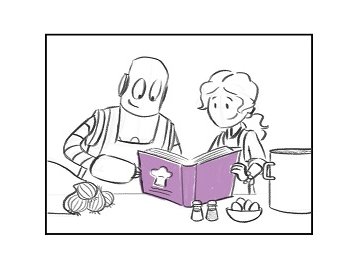Cooking Outside of the Kitchen
When Moby and Nomi prepare to cook in this lesson’s movie, Moby puts on an apron with the words קאָכט זיך נישט — meaning, in a literal sense, “Don’t cook!" (as in a pot of food cooking on the stove). However, although the phrase includes the verb קאָכן — to cook — this expression doesn’t really have to do with cooking. “קאָכט זיך נישט” as an expression actually means “remain calm,” “don’t get upset,” and “have patience”—good advice in and out of the kitchen.
The verb קאָכן is used in many other colorful expressions, including the following:
-
אָט אַזוי קאָכט מען די לאָקשן!
That’s the way it’s supposed to be done!
(Literally “That how the noodles are cooked!”)
-
פֿון מעשׂיות פֿאַרציילן קאָכט מען ניט קיין וועטשערע.
Actions speak louder than words.
(Literally “You can’t cook supper from telling stories.”)
-
פֿאַרקאָכן אַ קאַשע
make a mess of things
(Literally “to cook a porridge”)
-
עס קאָכט די שטאָט.
It’s the talk of the town.
(Literally “The city is cooking/boiling.”)
-
ער וויל וויסן וואָס עס קאָכט זיך בײַ יענעם אין טאָפּ.
He is a nosy person.
(Literally “He wants to know what’s cooking in someone else’s pot.”)
-
זײַן פֿאַרקאָכט אין עמעצן
to be infatuated with someone
(Literally “to be cooked in someone”)
-
זײַן אויסגעקאָכט מיט עמעצן
to be on intimate terms with someone
(Literally “to be cooked with someone”)
-
אַרומגיין ווי אַן אָפּגעקאָכטער
to look offended, humilated
(Literally “To go around like one upon whom boiling water has been poured”)
-
אַ קאָכלעפֿל
a busybody, one who is always trying to meddle in other people’s business
(Literally “a cooking spoon”)


